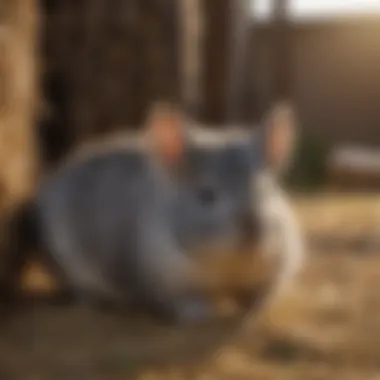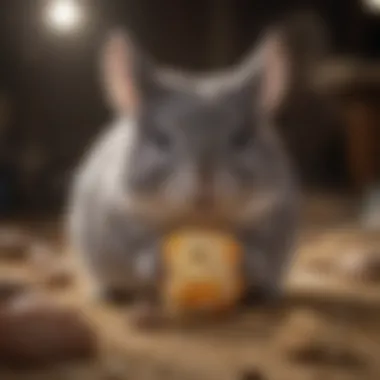Essential Guide to Proper Chinchilla Nutrition


Intro
Chinchillas are not just charming pets; they also have specific dietary needs that are critical to their health. Understanding how to feed them properly is essential for any owner. In this guide, we will explore the ins and outs of chinchilla nutrition and care. Readers will gain insights into what foods are appropriate, why certain items should be avoided, and how to ensure their pets remain healthy and happy.
Understanding Your Pet
Pet Behavior Basics
To feed a chinchilla effectively, it is important to understand its behavior. These animals are nocturnal and often active during the night. This means they may prefer to eat during those hours. Observing their eating habits can help you identify what foods they enjoy more, which can aid in creating a well-rounded diet.
Common Breed Characteristics
Chinchillas are typically small, soft-furred rodents, and they come in various breeds. Each breed can have slight variations in dietary needs. Researching the specific breed one owns is beneficial. For example, some breeds may require higher fiber content due to their size or metabolism.
Species-Specific Needs
Chinchillas require a high-fiber diet that is rich in hay, mainly timothy hay. Fresh vegetables should be introduced slowly to avoid digestive issues. They are sensitive to sugar, and fruits should only be given in moderation.
Pet Care and Maintenance
Feeding Guidelines
When it comes to feeding, consistency is crucial. A chinchilla's diet should consist of:
- Timothy hay: The primary food source, providing necessary fiber.
- Pellets: Choose high-quality chinchilla pellets without added sugar.
- Fresh vegetables: Offer small amounts of leafy greens like kale or romaine.
Grooming Essentials
Grooming is vital for maintaining a chinchilla's health. Regular brushes help remove dirt and loose fur. Special care should be taken with their dense fur to avoid matting. Bathing should never be done with water; instead, use dust baths weekly.
Hygiene Practices
Maintaining a clean habitat is essential. Remove waste and uneaten food daily. Clean the cage weekly with safe disinfectants to prevent health issues.
Training and Development
Basic Commands and Skills
While chinchillas are not known for their trainability, they can learn simple commands such as
Understanding Chinchilla Dietary Needs
Chinchillas are unique creatures with specific dietary requirements. Understanding their nutritional needs is crucial for their health. A proper diet influences their growth, coat condition, and overall vitality. By recognizing what chinchillas need, owners can better address their pets' dietary preferences and provide for their well-being.
Natural Habitat and Its Influence on Diet


In the wild, chinchillas inhabit the mountains of South America, particularly in Chile. Their natural diet primarily consists of grasses, seeds, and leaves, which are high in fiber. This influence is significant. A diet mimicking their natural habitat will help maintain their health in captivity. Wild chinchillas have evolved to process low-nutrient, high-fiber foods. Ensuring a similar intake in a domestic environment can prevent many health issues.
Nutritional Requirements
Chinchillas have three key nutritional components that are essential to their health: protein, fiber, vitamins, and minerals. Each plays a distinct role in promoting well-being.
Protein
Protein is vital for chinchillas, supporting growth and repair. It aids in muscle development and overall energy levels. Rabbits and other rodents typically require protein to maintain their bodily functions.
The key characteristic of protein is its role in tissue building. This makes it a beneficial choice in a balanced chinchilla diet. However, excessive protein can lead to kidney issues. Many chinchilla-specific pellets are formulated to meet this protein requirement without overloading their systems.
Fiber
Fiber is arguably the most important aspect of a chinchilla's diet. It promotes healthy digestion and helps prevent gastrointestinal issues. Without sufficient fiber intake, chinchillas can experience serious health problems like bloat or diarrhea.
The key characteristic of fiber is that it keeps the digestive tract functioning smoothly. This makes it a popular choice for owners seeking to provide a healthy diet. A high-fiber diet may include timothy hay or other similar grass hays, as these sources are rich in the necessary nutrients.
Vitamins and Minerals
Vitamins and minerals are also essential for chinchillas, supporting overall health and preventing deficiencies. Certain vitamins help with metabolism, while minerals assist with bone health.
The key characteristic of vitamins and minerals is their broad spectrum of functions in the body. This aspect is beneficial for chinchillas, helping them sustain their energy levels and general well-being. A lack of these nutrients can lead to serious health risks over time, underscoring their importance in a chinchilla's diet.
It is important that chinchilla owners understand these dietary needs to provide a healthy and well-balanced diet. Proper nutrition leads to a happier and healthier pet.
Types of Food for Chinchillas
Understanding the types of food suitable for chinchillas is fundamental for their overall health and well-being. Chinchillas have specific dietary needs that must be met to ensure they thrive. Each food type delivers unique benefits and addresses certain nutritional requirements. In this section, we will explore the key food categories for chinchillas, stressing the importance of hay, pellets, vegetables, and treats. All these elements contribute significantly to a balanced diet and help prevent health issues.
Hay: The Foundation of a Chinchilla's Diet
Hay stands as the cornerstone of a chinchilla's diet. High-quality hay, primarily timothy, orchard, or meadow hay, offers essential fiber that aids in digestion. Since chinchillas are herbivores, their digestive systems are designed to process fibrous materials. This fiber-rich diet not only prevents gastrointestinal problems but also helps maintain dental health since chewing on hay assists in naturally wearing down their continuously growing teeth.
It is vital to provide unlimited access to hay. The texture and smell should be fresh and pleasant. Whenever possible, avoid dusty or moldy hay, as this can lead to respiratory infecions and other health issues. Hay should form around 80% of their daily intake to meet their nutritional needs.
Pellets: Choosing the Right Type
Pellets complement hay in a chinchilla's diet. However, not all pellets are created equal. The right choice will offer a balanced mix of nutrients specifically formulated for chinchillas. Look for pellets high in fiber and low in protein and fat. A good option is Oxbow Essentials, which contains high quantities of fiber and essential vitamins.
Avoid pellets with added seeds, nuts, or dried fruit, as they can lead to obesity and dental problems. The quantity of pellets should be measured, ideally around 1-2 tablespoons per chinchilla per day, ensuring they maintain a balanced diet without overindulging.
Fresh Vegetables: What to Include and Avoid
In moderation, fresh vegetables can be excellent for chinchillas. Dark leafy greens like kale, romaine lettuce, or cilantro can provide additional nutrients. However, not all vegetables are suitable. Avoid starchy or high-sugar varieties like corn, potatoes, or carrots, as they can disrupt a chinchilla's digestive system.
When introducing vegetables, start with small amounts to observe how your chinchilla reacts. It's essential to wash vegetables thoroughly, removing pesticides or harmful chemicals. Initial servings can be as little as one or two small pieces several times a week.


Treats: Safe Options for Rewarding Behavior
Treats can play a role in rewarding chinchillas and reinforcing positive behavior. It is crucial to choose treats wisely to maintain their health. Suitable options include small amounts of dried herbs, occasional rose hips, or commercial treats specifically made for chinchillas. Avoid sugary snacks as they can lead to health complications.
Implement treats sparingly, ensuring they make up less than 5% of the overall diet. Observe portion sizes and frequency to maintain balance while enhancing your chinchilla's quality of life. In this way, treat-giving can serve as both a training tool and a way to bond with your pet.
Key Takeaway: A well-rounded diet for chinchillas requires a base of hay, balanced pellets, carefully selected vegetables, and minimal treats. Each food type contributes to their unique nutritional needs, promoting health and longevity.
Feeding Frequency and Portion Control
Feeding frequency and portion control are critical aspects when it comes to maintaining a healthy diet for chinchillas. Understanding how often and how much to feed these unique pets can influence their overall well-being. A well-structured feeding routine ensures that chinchillas receive the right nutrients at the right intervals. This not only supports their digestive health but also helps in preventing obesity and related health issues.
Understanding Chinchilla Appetite
Chinchillas have a naturally varied appetite. Unlike some pets that may overeat, chinchillas usually eat only when necessary. Their appetite can fluctuate based on multiple factors such as age, health, and environmental conditions. Recognizing these patterns is essential for any chinchilla owner.
Key points about chinchilla appetite:
- Active Hours: Chinchillas are crepuscular, meaning they are most active during dawn and dusk. This may impact their feeding habits, so it is ideal to provide food during these times.
- Environmental Stress: Changes in environment can affect their appetite. Move stresses can lead to decreased food intake.
- Health Monitoring: If a chinchilla stops eating or significantly reduces its intake, this may signal health issues. Owner should consult a veterinarian if this happens.
By monitoring their appetite closely, owners can gain insights into their chinchilla’s health and feeding needs.
Portion Sizes according to Age and Size
The portion size of food is not a one-size-fits-all matter. It varies based on factors such as age, size, and health condition of the chinchilla. Understanding these details is fundamental to ensuring a healthy feeding regimen.
Suggested portion sizes:
- Young Chinchillas (under 6 months): They require more nutrition for growth, and should get roughly 20-30 grams of pellets daily, plus unlimited hay. Fresh veggies should be offered in limited amounts.
- Adult Chinchillas (6 months to 5 years): Typical portions are about 30 grams of pellets each day, alongside constant access to hay. This age can tolerate very small amounts of fresh vegetables.
- Senior Chinchillas (over 5 years): Their needs might change, especially with declining health or dental issues. Monitoring their weight and adjusting thier portions to about 25 grams of pellets may be beneficial.
Note: Always consult a vet to personalize the feeding plan as it depends on individual health needs.
Common Misconceptions about Chinchilla Diet
Understanding common misconceptions about chinchilla diet is vital for ensuring these animals lead healthy lives. Many new pet owners hold onto outdated beliefs which can lead to poor dietary choices. Misunderstandings regarding what constitutes a proper diet directly affect a chinchilla's health. Addressing these myths is key to informing owners and helping them provide the right nutrition for their pets.
Myths about Feeding Fruits and Treats
A prevalent myth among pet owners is that fruits are a healthy addition to a chinchilla's diet. This misconception arises from the general perception that fruits, being natural, must be good. In reality, fruits contain high levels of sugar, which can be harmful to chinchillas. Their digestive systems are not equipped to handle sugar in significant quantities. Instead of providing benefits, fruits can lead to serious health problems like obesity and gastrointestinal issues.
Many people also believe that treats are best when they mimic human food choices. This is misguided. While treats can be offered, they should always be in moderation and only from safe options specifically designed for chinchillas. It’s essential to educate oneself on what is appropriate to feed these animals, focusing instead on their main dietary needs that favor hay and specially formulated pellets.
Important Note: Excess fruit and wrong treats can cause irreparable damage to a chinchilla’s health.
Understanding the Role of Sugar in Diet
Sugar plays a critical role in the diet of many animals, but for chinchillas, it is not something they need. In fact, excessive sugar consumption can lead to a series of health consequences. Chinchillas are herbivores and have evolved to consume a diet very low in sugar. Their natural food sources, like grass and hay, are designed to meet their nutritional needs without introducing sugar into their diets.


The implication of this is significant. Owners need to be vigilant about the sugar content in their pets' diets. Even small amounts can contribute to serious health problems. It’s crucial to read labels carefully when considering foods or treats for chinchillas. Choosing options that are high in fiber and low in sugar can prevent complications like dental issues and obesity.
When formulating a diet for a chinchilla, placing emphasis on high-quality hay, appropriate pellets, and occasional treats will support their overall health. Understanding the implications of sugar and recognizing the myths around feeding habits can make a profound difference in a chinchilla’s quality of life.
Potential Risks of Improper Feeding
Understanding the potential risks of improper feeding is central to ensuring the health and well-being of chinchillas. These small, sensitive animals have specific dietary needs that must be met. Many owners make mistakes, often leading to long-term health complications. Recognizing these risks is the first step towards maintaining a healthy diet for your pet.
Health Issues Linked to Poor Diet
Feeding chinchillas the wrong kinds of food can lead to a series of health issues. Chinchillas are particularly vulnerable to digestive problems and obesity, both of which stem from an improper diet. When high-fat or high-sugar foods are introduced in excess, it can cause serious digestive issues like diarrhea or bloating. Furthermore, insufficient fiber can obstruct their unique digestive processes, leading to serious health conditions like gastrointestinal stasis.
Another significant concern is dental health. Chinchillas have constantly growing teeth that require regular wear through chewing fibrous food, mainly hay. A diet lacking in adequate fiber can lead to dental overgrowth, which may require veterinary intervention to correct. If not treated, this can result in pain and further complications.
More concerning are the long-term diseases linked to poor diet. Excess carbohydrates can elevate glucose levels, leading to diabetes. Additionally, a deficiency in vitamins and minerals such as calcium or vitamin D can result in bone-related diseases, negatively affecting overall health in the long run.
Recognizing Signs of Dietary Deficiency
Awareness of the signs of dietary deficiencies is essential for any chinchilla owner. If a chinchilla is not getting the right nutrients, there are observable symptoms that should raise concern. Typical signs include
- Weight Loss: A sudden change in weight can indicate a nutritional shortfall or health issue.
- Lethargy: Lack of energy or unusual sleeping patterns may hint at deeper health problems.
- Dental Issues: Difficulty chewing or excessive drooling may signal dental health problems linked to diet.
- Poor Coat Quality: A dull or thin coat can indicate a lack of essential fatty acids or vitamins.
- Behavior Changes: Uncharacteristic aggression or withdrawal can indicate discomfort due to health issues.
Every chinchilla owner should maintain a balanced diet and closely monitor their pet's behavior and health status. Adjustments to their diet may be needed if you observe any of these signs. Regular consultations with a veterinarian are crucial as they can provide invaluable insights tailored to your chinchilla's specific needs. Such proactive steps can prevent many serious health issues and enhance your pet's quality of life.
Always prioritize a consistent assessment of your chinchilla’s dietary habits to sustain health and happiness.
Additional Considerations for Chinchilla Owners
When it comes to feeding chinchillas, there are key factors every owner should consider. Understanding the unique needs of these small mammals is paramount. Some of these considerations go beyond simple dietary components. They encompass environmental factors, health considerations, and the owner’s responsibility to stay informed. This section covers elements crucial for ensuring the well-being of chinchillas.
The Environment and Its Impact on Feeding Habits
The habitat where a chinchilla lives has a profound effect on its feeding behaviors. Chinchillas are sensitive to changes in their surroundings, and their dietary habits can be influenced by factors such as temperature, light, and noise. For instance, if a chinchilla feels stressed due to an unstable environment, its appetite might decrease, leading to inadequate nutrition.
Maintaining a quiet and stable space is important. Too much noise or unexpected changes can stress chinchillas, impacting not only their eating habits but overall health. Additionally, the availability of fresh water must be ensured, as dehydration can also affect appetite. Chinchillas should have constant access to clean, fresh water.
Moreover, the type of bedding used in cages can contribute to their well-being. Non-toxic materials that are dust-free are preferable to avoid respiratory issues. The overall cleanliness of their space plays an essential role in maintaining health, thus indirectly affecting how well they eat. Here are a few strategies to optimize their environment:
- Quiet Space: Keep the area calm and free from loud interruptions.
- Temperature Control: Chinchillas thrive in cooler temperatures; avoid excessive heat.
- Regular Maintenance: Clean the cage regularly to ensure a healthy living space.
Thus, understanding the environmental needs allows owners to create a suitable atmosphere that promotes good eating habits.
Consulting with a Veterinarian
Regular consultations with a veterinarian specialized in exotic animals help maintain the overall health of chinchillas. These experts can provide valuable insights regarding proper feeding practices. They can identify potential health issues that might arise from improper diet.
A veterinarian can also assist in developing a customized feeding program that considers the chinchilla's age, weight, and health status. This is particularly essential for young or elderly chinchillas which have different dietary requirements compared to adults. Health concerns, including dental diseases or digestive issues, often necessitate specialized feeding strategies.
Moreover, keeping abreast of nutritional research is more manageable with a veterinarian's guidance. They often have access to recent studies or trends that can aid in making informed decisions. The following points summarize why regular veterinary consultations are crucial:
- Individualized Care: Tailored diets considering specific health needs.
- Early Detection: Catching health issues before they worsen through check-ups.
- Updated Knowledge: Learning about new research about chinchilla nutrition.
Proper habitat and expert advice are invaluable when caring for chinchillas.







